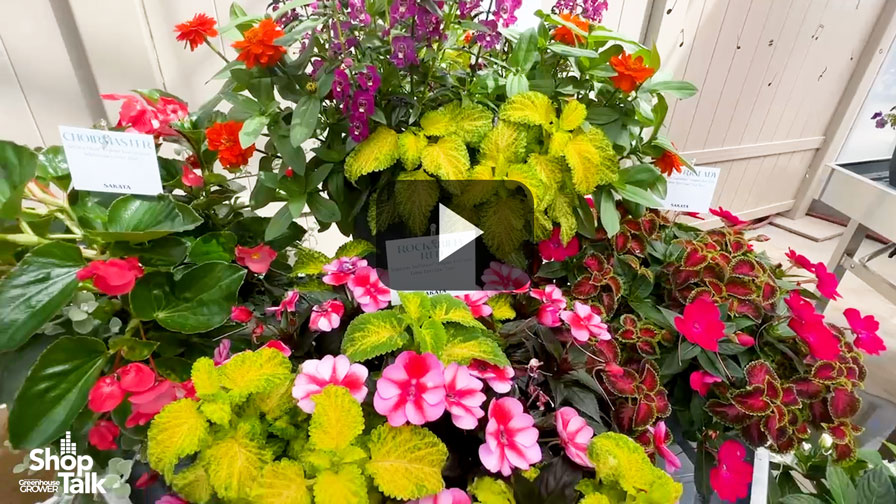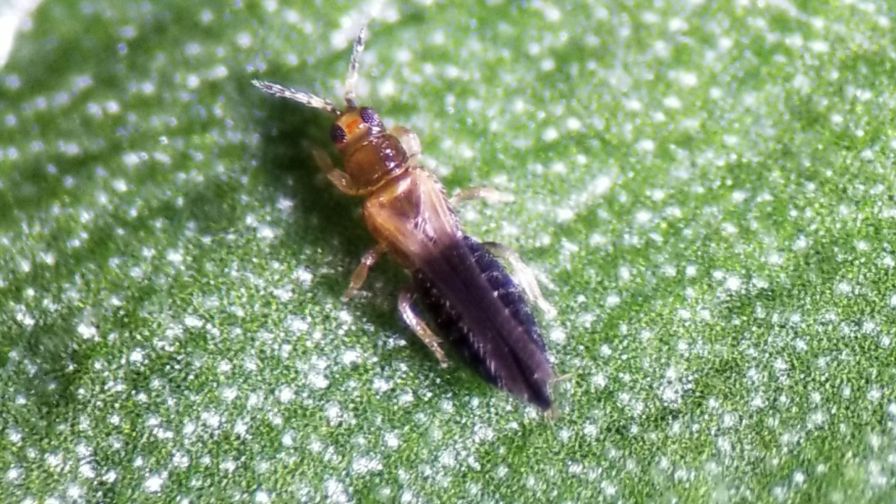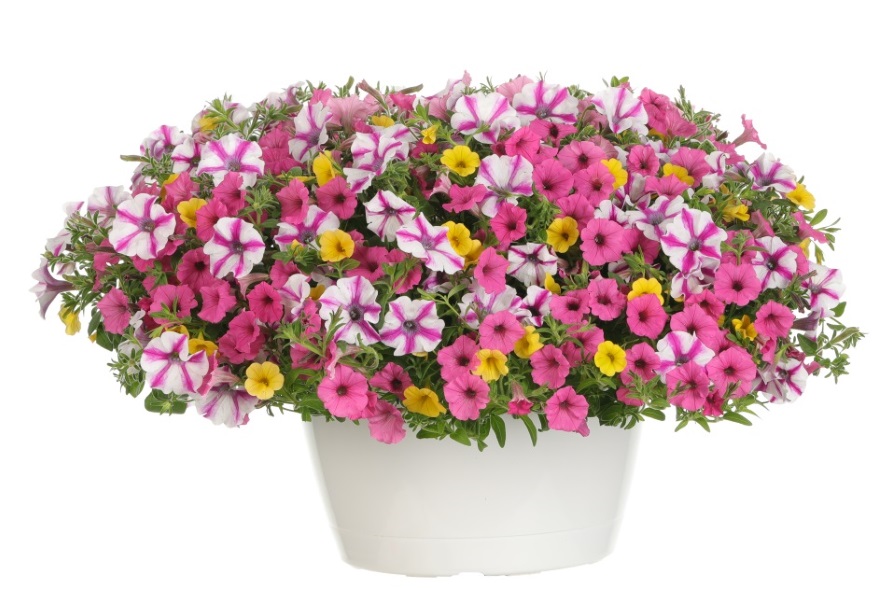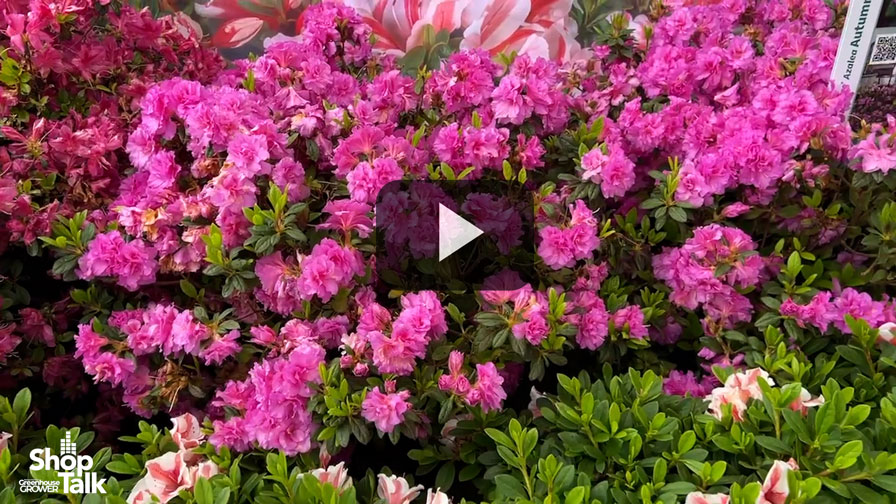Euro Style Flower Trials
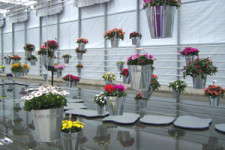
With all the global participation in the California Spring Trials, I had wondered if it would be worthwhile to also attend Europe’s Flower Trials in June. Would I really see anything I hadn’t already seen from many of the same breeders? And for the most part, the ones that don’t participate in the California trials don’t serve U.S. growers. But each year the Flower Trials are gaining momentum and interest.
Starting out with just five companies in 2003, the Flower Trials have grown to include 35 companies at 24 locations in Holland and Germany. Holland’s Westland region dominates with 19 companies, then 10 in Aalsmeer and five in Germany. Many U.S. growers attend to get new ideas on crops and presentations and to be the first to bring new genetics to market.
While the seed-based companies still have their traditional pack trials in May, the Flower Trials are more for the entire supply chain and in many cases leading young plant producers with very large, modern production facilities host them. These young plant producers often take on the role broker sales organizations have in the United States.
Holland truly is the production center for our global industry. Even larger European countries rely on Dutch-produced plants for retail sales and the auction system assures a plentiful and highly competitive supply. More often than not, a German-bred plant is produced in Holland and then sold back to customers in Germany.
Varieties must be able to withstand transportation logistics. Quick turns and high density production and shipping are the keys to profit. For that reason, both the Dutch and the Danes are obsessed with how many plants can fit on a cart and explains why breeding compact varieties and using plant growth regulators are so important. Shipping carts with 10 full shelves instead of nine can mean the difference between barely breaking even and making money.
I attended the Flower Trials from June 14-17 as a guest of Sakata Ornamentals and Beekenkamp. Sakata’s Marketing and Communications Manager Natalia Hamill was my tour guide. We stayed in Delft and visited about a dozen of the trials locations in the Westland and near Aalsmeer and two garden centers. Here are the highlights from the places we visited in Holland:
Beekenkamp Plants B.V.
Beekenkamp in Maasdijk is a global giant in young plants and cuttings. Ranked at No. 2 on Greenhouse Grower’s Top 10 Cuttings Producers, Beekenkamp produces 635 million cuttings and 1.5 billion young plants a year at farms in Holland, France, Kenya, Ethiopia and Uganda. The family-owned business produces vegetable plants, chrysanthemums, ornamental plants and has a packaging division. More recently, Beekenkamp has been an up-and-coming breeder, specializing in blooming potted plants, notably begonias. U.S. growers were first introduced to Beekenkamp varieties through Floremara, a joint venture with Holtkamp Greenhouses. Now Beekenkamp will be working with additional brokers and is ramping up its efforts in North America. The Waterfall begonias have been a hit so far. Other items include a full line or Elatior begonias and poinsettias, dahlias, asters, helleborus, lavender, celosia and New Guinea impatiens.
Benary
German flower breeder Benary exhibited at Schneider Young Plants in Maasdijk, which showed its assortment of vegetative petunias from Danziger, Suntory and Westhoff. Other niche lines include the Wild Rabbit violas, which had flower petals that looked like bunny ears, and a collection of sedum mixes and perennials.
Benary’s displays emphasized the value of seed as an input. In a vignette with a historic backdrop, visitors could see and touch seed in bulk and see vials full of different types of seed. “Many growers receive plugs and hardly know what’s from seed and cuttings,” says Benary’s Managing Director Matthias Redlefsen. “We have 20 people who do nothng but research on seed. We’re a major perennial breeder and delivering a professional level of germination and uniformity is vital.”
In addition to its own breeding, Benary has been integrating the Bodger genetics it acquired in annuals and improving those. Additional vignettes showed plants in the plug and finish stages, on carts and headed for retail and then the final destination–the landscape.
Benary also recently did away with the product manager level position larger companies have. “Our sales representatives focus on market development and the breeder focuses on product development,” Redlefsen explains. “If breeders don’t understand the product in the market place, they shouldn’t breed.”
Combinations B.V.
Based in ‘s-Gravenzande, Combinations was created in 2008 as a merger between Combiplant and Combifleur and has nearly 100 years experience supplying seeds and young plants for cultivating ornamentals and vegetables.. At the 16-hectare facility, Combinations hosted Floranova, Hem Genetics, Takii Europe and Thompson & Morgan, which also all participate in the California Spring Trials. Combinations also does some of its own breeding, including a pollen-free potted sunflower line called Sunsation. The grower used its flood floor to create one of the more interesting and artistic displays–a path with stepping stones through water, chains resembling rain and hanging shiny silver pails full of potted plants.
Fides Oro
Based in De Lier, Fides has been a leader from day one as the organizer of the Flower Trials during production week 24, calling its open house the Fides Flower Festival. Its new identity in North America is Fides Oro after parent company Agribio Group purchased Guatemalan cuttings producer Oro Farms. Agribio Group also just became an investor in Gene Twister–a database of genetics and their traits to help breeders speed up the selection process.
Fides prides itself on taking the initiative to bring industry segments together. One example is the Dutch Creations group of noncompeting floral breeders covering blooming potted plants and fresh cut flowers. It’s latest effort is the creation of HortiAlliance–a group of 20 noncompeting companies on the input and equipment side who all serve growers. During the Flower Trials, Fides created a mini tradeshow featuring the companies and developed an educational program. As part of the program, John Van Wingerden of Express Seed and Green Circle Growers in Ohio was interviewed about his investment in Enterprise Resource Planning software 11 years ago and the benefits since. Fides also maximized the value of the event by hosting special days to give growers access to retailers, exporters and government officials.
In varieties, Fides Oro is making a big push in the global pot mum market, capturing market share in Europe and producing cuttings in Santa Paula, Calif., for U.S. growers. “We hope to get mums off the Quarintine-37 list,” says Mark Schermer, who manages Fides Oro in North America. “Growers are ready to receive cuttings from offshore.”
In vegetative annuals, a preview of new introductions included the large-flowered Margarita Supreme osteospermums, bicolored Fortunia petunias and Belcanto interspecific geraniums, which Schermer says are the future of the zonal market.
Florensis
Based in Ambacht, Florensis is another very large breeder and young plant producer. In addition to producing Ball FloraPlant’s lines and MixMaster combinations, Florensis has several key series of its own, including Astra osteospermums and Glow petunias. One of the exhibitors was Floramedia–the John Henry Co.’s counterpart in Europe. Innovative packaging and marketing concepts were presented. These are the kinds of things we see at the California trials but the concepts rarely seem to make it to retail in the States.
Florensis created rooms of innovative displays showcasing a variety at a time, like Ball’s black petunias. Lucky lantanas were displayed in front of large images from a deck of cards. Archangel angelonias took flight with angel’s wings. Not to be outdone by other new begonia lines, the new ‘Glowing Embers’ was nestled in packaging that looks as hot as lit coals.
Moerheim New Plant
Suntory had a big presence at Moerheim New Plant in Leimuiderbrug. This is where we got to see varieties that have not been introduced to the United States yet. One line that’s sure to capture a lot of attention is the Surdaisy brachyscomes, which probably came from Suntory’s Bonza Botanicals venture in Australia. The Crackling Fire boliviensis begonias should be a big hit, too, with the number of flowers presented on these plants with a tight, compact habit.
Another striking introduction is ‘Surfinia Variegated Purple Mini’ with variegated foliage. The habit seems to be a big improvement over an older variety introduced on the market more than 10 years ago called ‘Limelight.’ In Europe, SunParasol mandevillas are called Sundavilles. Moerheim also produces vegetative annuals bred by Channel Island Plants in the United Kingdom.
PanAmerican Seed
While Ball’s vegetative varieties were showcased at Florensis, its seed-based breeding divisions presented their new and tried and true at PanAmerican Seed’s facility in Rijsenhout. Since the acquisition of Kieft Pro Seeds, Ball has sorted the varieties and put all the annuals under PanAmerican Seed and all the perennials under Kieft. The grass lines bred by Kieft are now part of PanAmerican’s Fantastic Foliage line. The introductions were the same as what was presented during California Spring Trials.
Royal Van Zanten
Also based in Rijsenhout, Royal Van Zanten hosted Danziger “Dan” Flower Farms, Imperial Plants and cyclamen breeder Morel Diffusion. Royal Van Zanten is a century company that built its business on chrysanthemums but it has diversified into exciting blooming potted categories including celosias and 24 varieties of Princess Lilies alstroemeria. Another promising introduction is the showy ‘Salt Lake’ limonium for larger pots.
Danziger showcased its entire line, which is dramatically expanding into perennials. Danziger’s Mixis combination recipes also have been a big hit.
Sakata Ornamentals
Based in Japan with an office in Holland, Sakata held its trials at a demonstration greenhouse called Demokwekerij Westland in Honselersdijk, where visitors could see greenhouse equipment and systems in action, growing hydroponic vegetables, as well as soil and water analysis.
In ornamentals, Sakata has global leadership positions in three key areas–cut flowers, blooming potted plants and bedding plants. Lisianthus is an important crop along with sunflowers. We saw a preview of the new Vincent sunflowers that face upward in bouquets. Cut flowers are bred for two types of production–choosing the variety based on the time of year or choosing a variety to program all year.
Campanula and platycodon are key pot crops that offer dual use interest as an indoor plant and a perennial. The Astra platycodons are especially popular in Europe and supported by big promotions. This is a crop that’s hardly grown in the United States.
Gerberas are another major pot crop and Sakata showed a full trial of its Festivals with competing varieties. The new Durora gerberas were bred for outdoor weather tolerance, with thicker petals and leaves. They aren’t perennials but ideal for patios and feature tags promoting outdoor use.
On the landscape side, Sunpatiens impatiens have become preferred by European landscapers. For the past few years, traditional walleriana impatiens had been suffering from downy mildew, which is believed to have been brought in on double impatiens cuttings. This hasn’t been a problem in the United States, but landscapers in Europe have been seeing impatiens turn to mush overnight, Sakata’s Sales and Marketing Director Ron Cramer says. With sun, heat and cold tolerance, Sunpatiens last most of the year.
Osteospermum has been another big crop for Sakata since acquiring the Danish Cape Daisy line, which is now 20 years old and evolving and improving. Sakata presented a full comparison trial with all the leading osteospermum series on the market.
Selecta
Based in Germany, Selecta presented its trials in a secure but floating greenhouse in Naaldwijk. Branded pots were big for growers who would prefer not to use tags. We also got a preview of many new varieties that have yet to be introduced in the United States. AlpeTunias are a vigorous line of petunias developed by a Bavarian breeder who was looking for his dream red in Surfinia petunias. Ideal for baskets and balconies, plants trail 7 feet but will respond to plant growth regulators.
The Diantica hardy carnation line is an interspecific cross that makes perennial dianthus more production friendly, finishing with a flush of color. The Oscar pot carnation was bred with uniformity in mind. Carnations have been a specialty for Selecta since the company first started breeding cut flowers.
The Tierra landscape verbena series is similar to ‘Homestead Purple’ and hardy to zone 6. Delaya dahlias also were bred for landscape performance. LaTina New Guinea impatiens are a compact series for high-density production. We also saw the next three colors in 3D double osteospermums, which are marketed as Flower Power doubles in Europe.
In Trixi liners, European growers are still rooting three cuttings into a single liner instead of fusing three small liners together as Trixi 2.0. This is because there is more pressure on margins and inputs in Europe and because the Dömmen Confetti patent conflict only applies to the U.S. market. In Europe, most Trixi liners are grown singly in pots vs. baskets.
Syngenta
Syngenta Flowers and its brokerage division Syngenta FloriPro Services exhibited at two different locations in De Lier. The flowers were presented in the atrium of Priva’s headquarters, a modern architectural wonder. Priva partnered on educational programs by offering its expertise in greenhouse climate and process controls. Growers were invited to four days of education to help them produce better poinsettias, mums, annuals and perennials. One promising new perennial is the naturally dwarf Desert Eve achilleas in five colors. “Growers bear all the risk, that’s why we are giving them technical advice to be successful,” says Syngenta Crop Specialist Heiki Gronemann. “Syngenta is in the solutions business–the full package around the product. We are focusing on technical expertise and education.”



